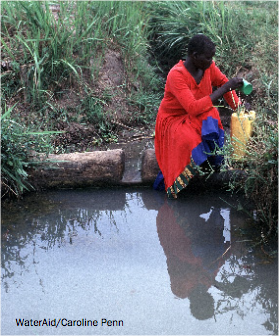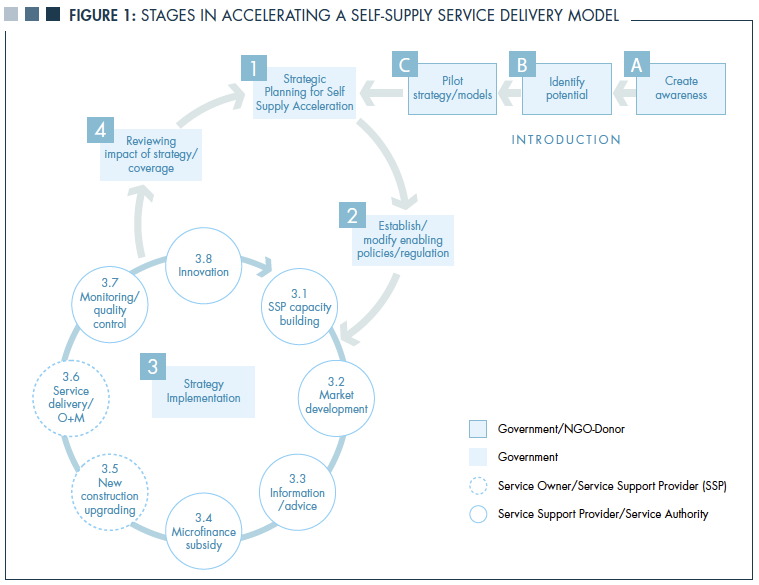Alternative Service Provider Options

Alternative service provider options refer to models such as self-supply and public-private partnerships, that are a departure from the conventional model of community-based management (CBM) that has tended to dominate many rural water sectors. However, they are formally recognised in sector policy and supported.
Why is it important for sustainable services at scale?
Sustainable service provision based on community based management needs service options to be well matched to the local context, service levels, technology and type of settlement. If formally recognised and supported, community based management can work. However, in many settings it struggles due to the reliance on volunteers and informal community institutions. Alternatives such as municipal supply, small-scale private suppliers (public-private partnerships) or self-supply, where properly supported, can improve service to rural water users and extend it to those who are currently without.
Public private partnerships
Contracting local private operators with specialist or professional skills can improve services and increase efficiencies beyond the capacity of conventional CBM approaches. Formal delegation of management arrangements in most rural areas is a fairly recent phenomenon and requires a step-change in management practices.
Arrangements rely on a 3-part arrangement between a contracting authority (usually the local government), an operator, and some form of regulatory body and/or support agency to help guide and monitor the contractual relationships. In some West African countries and in South Africa, private sector support agencies have taken up this role.
Self supply
Self supply fills the gap where public or formal private sector-led approaches do not reach, especially in scattered rural communities and where water sources are easily available. Self supply is not easily quantifiable, and historically has not been formally recognized as a management option within sector policy or formal benchmarks. This is despite the fact that self-improvement and investment in individual water supply systems over time represents a significant portion of financing.
Government agencies and NGOs have an important role to play in promoting self supply. Promotion can take many forms, from awareness raising and technical assistance on practical ways of installing household systems, to providing subsidies for installation.

Case study examples
In Zimbabwe, government and donor programmes have supported shallow well protection and upgrading. By 2006, over 120,000 family wells had been up-graded, serving more than 1.5 million people with minimal subsidies from donors and government (US$3-5 per capita).
Since 2000, the Directorate of Water Development in Uganda has been expanding a pilot model for delegated O&M of small town water supply systems based on local private sector engagement.
Burkina Faso tested a model in which private firms are awarded a handpump maintenance or installation and maintenance contract in one or more Communes. Delegated contracts have met with some success, especially in achieving economies of scale
Selected references, tools and templates
- Triple-S Supply briefing note
- Triple-S Public Private Partnerships briefing note
- Alternative service provider options building block summary sheet
Links
Self Supply
- WSP/RWSN: An introduction to self supply: Putting the user first
- WSP & RWSN: Investigating options for self-help water supply
- RWSN/UNICEF: Implementation plan for self supply piloting in Luapula province (Zambia)
- WEDC Conference: Integrating a new approach - the example of self supply
- IRC: Linking multiple use services and self supply principles
- RWSN: Accelerating self supply: A case study from Uganda 2010
- WEDC Conference:"Self supply" in Mali: Early steps towards an innovatory approach
- WEDC Conference: Self-help initiatives to improve water supplies in Eastern and Central Uganda
- RWSN: Accelerating self supply: A case study from Zambia
- RWSN: Accelerating self supply: Mali
- WEDC Conference: Developing low-cost household water supply options: The potential of self supply in Ethiopia
- WEDC Conference: Assessing the potential for self supply in Zambia
- WEDC Conference: Achievements and lessons learned from the Uganda self-supply pilot project 2006-2008
- WEDC Conference: Self supply for community water supply in Ghana
- RWSN: Self supply
Public Private Partnerships (PPP)
- Government of Senegal: Public private partnership reform of delegated management of rural motorised boreholes in Senegal
- WSP: Delegating water and sanitation service to autonomous operators: Lessons from small municipalities in Ecuador
- WaterAid: Private sector participation in rural water and sanitation service delivery in Uganda: A case study in four districts
- Public policy for the private sector: Rural water service: is a private national operator a viable business model?
- OECD global forum on sustainable development: The role of the private sector in peri-urban or rural water services in emerging countries
- WaterAid: Private operation in the rural water supply in Central Tanzania: Quick fixes and slow transitions
- DfID: Small scale private sector participation in the rural water supply sector: Knowledge review
- WSP: The growth of the private sector participation in rural water supply and sanitation in Bangladesh
- IFC & WSP: Improving rural water service in Rwanda with public-private partnerships
- WSP: A review of progress in seven African countries. Public-private partnerships for small piped schemes
- World Bank: Private operators and rural water supply
- WEDC Conference: Private sector involvement in rural water supply: Case studies from Uganda
- AWRA International Specialty Conference: The legal, institutional and financial framework to enable small scale service provision of rural water supplies in Africa
Acknowledgements
- Alternative service provider options. Water Services That Last. IRC.
